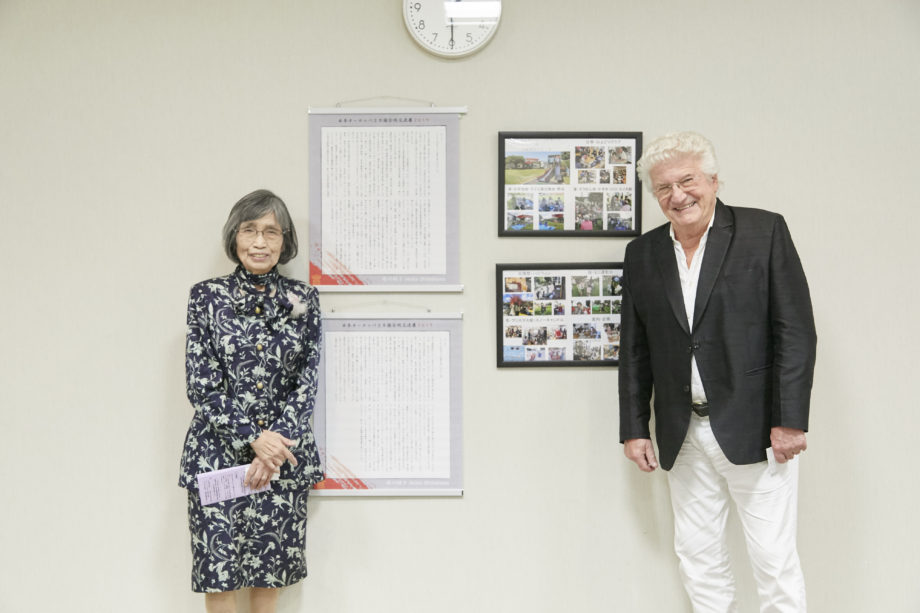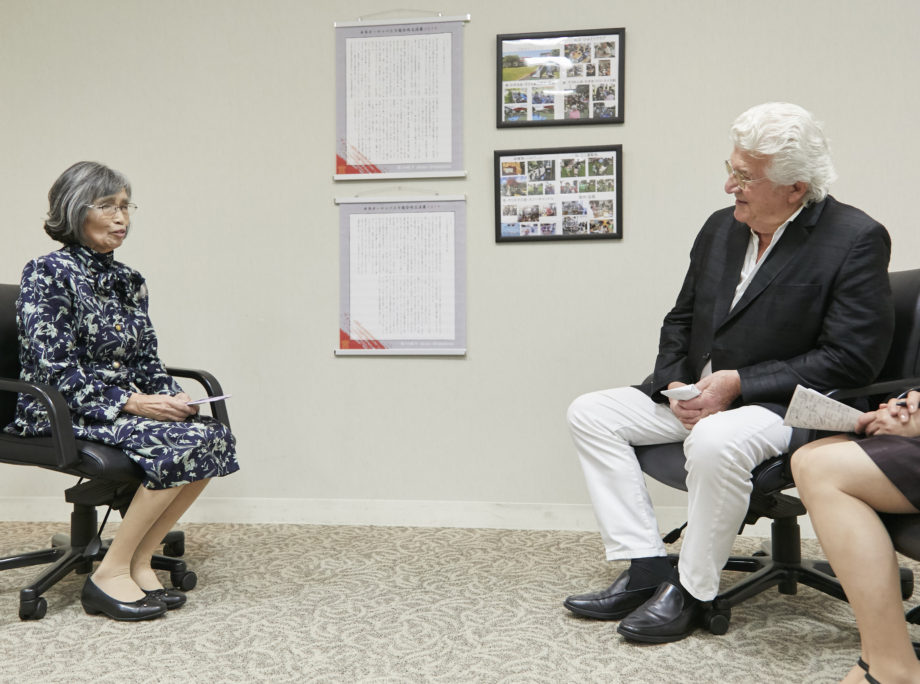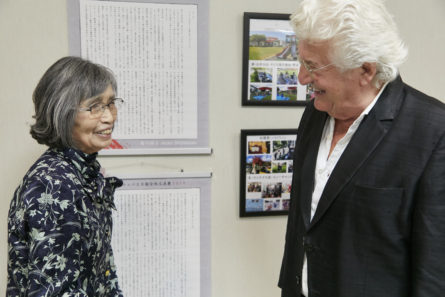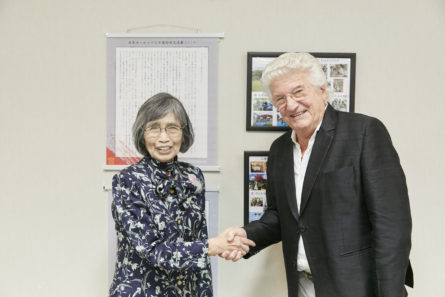- JEPAA Member
- Essey
- Akiko Shibakawa
- エッセイ
- 柴川明子
© 2024 Akiko Shibakawa.
SCROLL
Portfolio /作品一覧
- むくどりおばあちゃんの夢を追い続けて 1/Chasing Grandma Mukudori’s Dream
- むくどりおばあちゃんの夢を追い続けて 2/Chasing Grandma Mukudori’s Dream
Interview article /対談記事
博愛の理念と情熱を抱く、北の大地の夢追い人

クラウス・メンツ・ザンダー(以下、ザンダー):今日は北海道からこの日のためにお越しいただき、ありがとうございます。柴川先生はご自身の福祉事業をテーマとして執筆を行われていらっしゃいますが、よろしければその事業について解説いただけますか?
柴川明子(以下、柴川):24 年前から、これは、『むくどりホーム・ふれあいの会』という活動を始めました。むくどりという名前は、私の家の向かいに公園がありまして、そこが、藤野むくどり公園という名前が付いていましたので、私の活動も『むくどりホーム・ふれあいの会』という名前にしました。私は、20 歳の頃に、盲学校の実習に行ったことがありますけれども、そのときに出会った親子に「おうちに帰ってから、近所の子どもたちと遊びますか」って聞きましたら、「そういう時間もないし、チャンスもないし、場所もありません」って聞いたので、ぜひ誰でもがみんなで交流できる場所をつくりたいと、私が20 歳のときに思いました。ヒントになったのは、カナダに研修視察旅行に行ったときに見た「ドロップインセンター」という施設でした。これは、地域の親子が気軽に立ち寄って遊びながら交流ができる場所で、親同士、子ども同士のつながりができる、ゆったりした雰囲気を見て、こういう形で活動を始めたいと思いました。
ザンダー:むくどりホームにいらっしゃるのは、どういう方々が多いですか?
柴川:誰でもどうぞ、みんなでお友達になりましょうというポリシーでやっておりますので、一言ではなかなか説明が難しいですね。お母さんのお腹の中にいる頃から来ている子どももいるし、小学生も、幼稚園の生徒も、中学生も、高校生も、大学生も、そして、お年寄りの人も、障害を持っていて養護学校へ通っている子どもたちもいるし、本当にさまざまです。会員制や登録制、予約制でもないので、来たいなと思ったときに来て、帰りたいと思ったときに帰ってもらって大丈夫です。
ザンダー:ホームの中では、訪れた方はどんなことをしているんですか?
柴川:その日によって色々ですね。例えば、手話で歌を歌いましょうとか、障害についてみんなで考え、話し合いましょうとか。教える人も色々で、例えば参加しているお母さんたちが、自分の得意なお料理をみんなで一緒に作ろうっていってみんなでお料理したり。高機能障害のある方が、チョーク画を教えてくれたりとか。ホームとして一番大事なのは、とにかく受け入れるということですね。どなたでもどうぞ、よくいらっしゃいました、という精神です。
ザンダー:しかし、こうした事業と言いますか、場所を作るというのは、個人には難しいことではないかと思います。施設や公園は、どのようにして用意されたのですか?
柴川:現在のむくどり公園は、もともとは主人の所有していた土地だったんです。私が活動の準備を進めていた際に、札幌市が河川用地として取り壊された公園に代わる新しい公園の用地を札幌市が探していたので、交渉の中で私がむくどりホームの構想を伝えたところ、ホームの利用者が安心して遊べるよう、公園のバリアフリー化が実現しました。
ザンダー:素晴らしい、柴川先生の考えが、大きな流れを作ったのですね。
柴川:ただ、私が当初考えていたよりも、公園の規模が大きくなったので、ホームとしての建物を別に設ける必要がありました。そこで、私が住んでいた家を一部リフォームして、ベランダだった所をお部屋に拡張したり、それから、押し入れだった所を普通のフロアにしたりなどしました。活動を始めて2 年半後に、自宅をむくどりホーム用に完全開放して、私たちは別の場所に住んでいます。
本当に伝えたいことは、出会った人を大切にすること、会った人を支配したり、自分が自由に語れなくしたりっていうことをしないで、尊重するっていうことなんです。そういう対人関係をみんなが心掛けて、お互いを大切にして、自分の命も大切、これ、同じように出会った相手の命も大切。そこをみんなが自覚しながら、お互いを尊重し合っていけたらいいなと思います。
ザンダー:先生のこのプロジェクト、とても素晴らしいプロジェクトだと思います。写真を拝見しましたが、みなさんとても楽しそうで、良い顔をしています。
柴川:いろんな人がサポートしてくださったおかげでできています。公園の件も、運営についても、協力して下さったからこそ、今がありますから。
ザンダー:しかし、すべては柴川先生の掲げる理念と、それを実現したいという情熱が素晴らしかったからこそ、多くの人を動かしたのだと思います。本日はありがとうございました。先生とお話しできて本当に良かったです。
(2019年特別対談 柴川明子×クラウス・メンツ・ザンダー)
A dream chaser from the lands of the north who has an idea and passion for philanthropy

Klaus Menz-Sander (hereinafter referred to as“Sander”): Thank you for coming all the way from Hokkaido to be here day. It’s come to my attention that you’ve written books about your own philanthropic work, Mrs Shibakawa. So could you please tell me about the philanthropic work that you do?
Akiko Shibakawa (hereinafter referred to as “Shibakawa”): 24 years ago, I started an initiative called the“ Mukudori Home/Fureai-nokai.” I named this initiative “Mukudori Home/ Fureai-no-kai” because the park situated across from my house is called Fujinomukudori Park. When I was around 20 years old, I received training at a school for the blind. During that time, I would ask parents and children whether they were going to play with the children nearby after getting home. However, the response I heard for that question was “We don’t have the time, opportunity, nor a place nearby to do that.” So that’s when my 20 year old self first thought about wanting to create a place where everyone could interact with one another. The inspiration for creating such a place came from the “Drop-In Center,” which was a facility I came across when I went to Canada for a study trip. The Drop-In Center was a place where local parents and their children could easily stop by and interact with one another while playing together. So after seeing the relaxed atmosphere there that connected parents with one another, as well as children with one another, I thought to myself that I wanted to start an initiative just like this.
Sander: What are the kinds of people that visit Mukudori Home on a frequent basis?
Shibakawa: We have a policy where everyone is welcomed and encouraged to be friends with one another. So it’s quite difficult to describe our visitors in a single word. There are children who’ve been coming to our facility ever since they were still in their mother’s womb. There are also elementary schoolers, kindergarteners, middle schoolers, high schoolers, college students, elderly people as well as disabled children who go to the school for the disabled.
Therefore, there’s really all sorts of people coming in. Since we don’t have a membership and registration system, or a reservation system, people can come and go as they please.
Sander: What sort of things do visitors do at your facility?
Shibakawa: It varies depending on the day. For example, there are times when we sing songs in sign language, as well as times when we think and have discussions about disabilities. The people teaching also varies. For example, there are times when the mothers will take part in collectively cooking their signature dishes. There are also times when people with high functional disorders will teach others how to do chalk drawings. The most important thing for the facility is making sure that people feel accepted. Therefore, we welcome everyone and encourage everyone to visit us frequently.
Sander: But I think it’s difficult for an individual to create such a place that does this sort of work. So how did you set up the facility and the park?
Shibakawa: My husband used to own the land where Mukudori Park is currently situated. And when I was preparing for the initiative, the city of Sapporo was also looking for a place to build a new park that would replace another park that had been demolished and transformed into a river site. So during negotiations, I expressed my idea to build Mukudori Home there, and have since made the park accessible to people with disabilities, so that visitors of Mukudori Home can play there in peace.
Sander: That’s great, Mrs Shibakawa. Your ideas have made a great difference.
Shibakawa: But the size of the park ended up being bigger than I initially thought. So I had to set up the building for Mukudori Home in a separate location from the park. Because of this, I renovated parts of the house I was living in by doing things like expanding the rooms into the area where the veranda used to be, and also replacing the closet with a regular floor. 2 years and 6 months later 1 started this activity, this house is being used solely as Mukudori Home. So we’re now living in a different location. What I really want to tell people is, rather than controlling the people you meet and preventing them from speaking freely, you should instead value those you’ve encountered and respect them as well.
I want people to aspire to have that sort of relationship with each other and to value one another. I also want people to value the lives of others too, and to realize that the lives of the people they’ve encountered is also important. I hope that everyone is able to stay aware about these things while respecting one another.
Sander: I think this project of yours is very wonderful. I had a look at the pictures and everyone seemed very happy and had a smile on their faces.
Shibakawa: I was able to do it thanks to the support of a variety of people. The project is also the way that it is today because of the people who cooperated with us in managing the project and dealing with the matter concerning the park.
Sander: However, I think this was all made possible and many people were moved because of the idea you put forth as well as the wonderful passion you had that turned this idea into a reality. Thank you for your time today. I’m glad that I was able to speak to you.
Profile /経歴
柴川明子 Akiko Shibakawa
1935年生まれ
むくどりホーム・ふれあいの会 主宰
作品出展国遍歴(JEPAA関連事業):ドイツ、ベルギー、カナダ、マルタ共和国など
Born:1935,Japan
President of Mukudori Home/Fureai-nokai
Exhibition of Works(JEPAA): Germany, Belgium, Canada,Malta…

-430x1101.jpg)
-430x1102.jpg)




